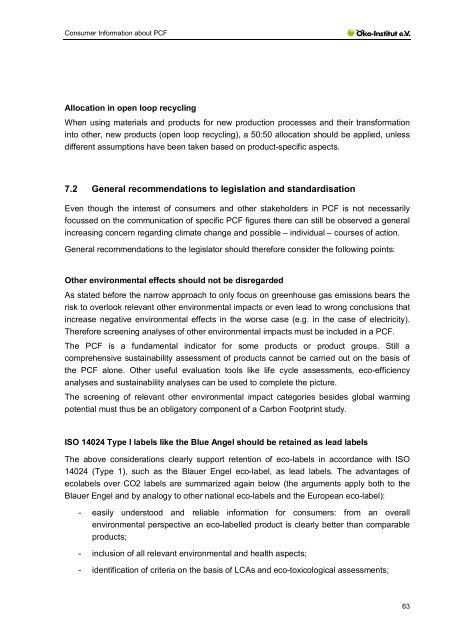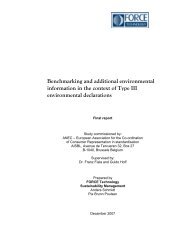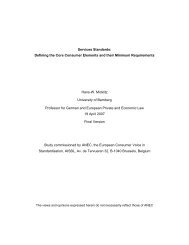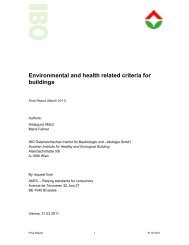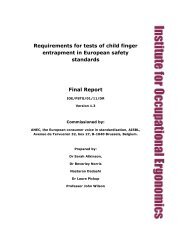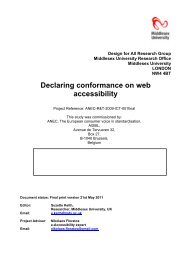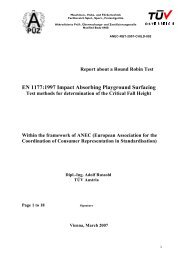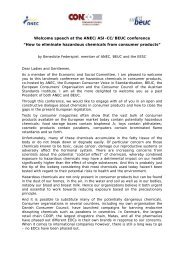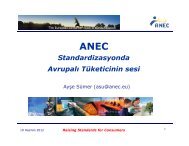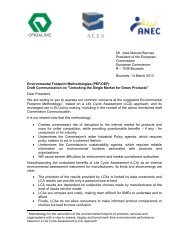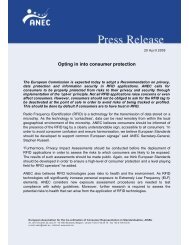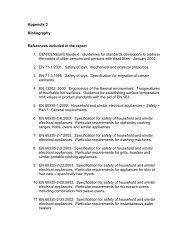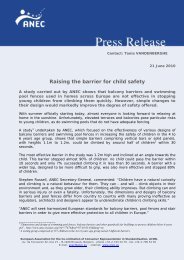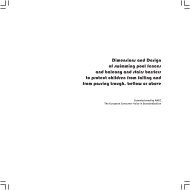Requirements on Consumer Information about Product ... - ANEC
Requirements on Consumer Information about Product ... - ANEC
Requirements on Consumer Information about Product ... - ANEC
You also want an ePaper? Increase the reach of your titles
YUMPU automatically turns print PDFs into web optimized ePapers that Google loves.
C<strong>on</strong>sumer Informati<strong>on</strong> <strong>about</strong> PCF<br />
Allocati<strong>on</strong> in open loop recycling<br />
When using materials and products for new producti<strong>on</strong> processes and their transformati<strong>on</strong><br />
into other, new products (open loop recycling), a 50:50 allocati<strong>on</strong> should be applied, unless<br />
different assumpti<strong>on</strong>s have been taken based <strong>on</strong> product-specific aspects.<br />
7.2 General recommendati<strong>on</strong>s to legislati<strong>on</strong> and standardisati<strong>on</strong><br />
Even though the interest of c<strong>on</strong>sumers and other stakeholders in PCF is not necessarily<br />
focussed <strong>on</strong> the communicati<strong>on</strong> of specific PCF figures there can still be observed a general<br />
increasing c<strong>on</strong>cern regarding climate change and possible – individual – courses of acti<strong>on</strong>.<br />
General recommendati<strong>on</strong>s to the legislator should therefore c<strong>on</strong>sider the following points:<br />
Other envir<strong>on</strong>mental effects should not be disregarded<br />
As stated before the narrow approach to <strong>on</strong>ly focus <strong>on</strong> greenhouse gas emissi<strong>on</strong>s bears the<br />
risk to overlook relevant other envir<strong>on</strong>mental impacts or even lead to wr<strong>on</strong>g c<strong>on</strong>clusi<strong>on</strong>s that<br />
increase negative envir<strong>on</strong>mental effects in the worse case (e.g. in the case of electricity).<br />
Therefore screening analyses of other envir<strong>on</strong>mental impacts must be included in a PCF.<br />
The PCF is a fundamental indicator for some products or product groups. Still a<br />
comprehensive sustainability assessment of products cannot be carried out <strong>on</strong> the basis of<br />
the PCF al<strong>on</strong>e. Other useful evaluati<strong>on</strong> tools like life cycle assessments, eco-efficiency<br />
analyses and sustainability analyses can be used to complete the picture.<br />
The screening of relevant other envir<strong>on</strong>mental impact categories besides global warming<br />
potential must thus be an obligatory comp<strong>on</strong>ent of a Carb<strong>on</strong> Footprint study.<br />
ISO 14024 Type I labels like the Blue Angel should be retained as lead labels<br />
The above c<strong>on</strong>siderati<strong>on</strong>s clearly support retenti<strong>on</strong> of eco-labels in accordance with ISO<br />
14024 (Type 1), such as the Blauer Engel eco-label, as lead labels. The advantages of<br />
ecolabels over CO2 labels are summarized again below (the arguments apply both to the<br />
Blauer Engel and by analogy to other nati<strong>on</strong>al eco-labels and the European eco-label):<br />
- easily understood and reliable informati<strong>on</strong> for c<strong>on</strong>sumers: from an overall<br />
envir<strong>on</strong>mental perspective an eco-labelled product is clearly better than comparable<br />
products;<br />
- inclusi<strong>on</strong> of all relevant envir<strong>on</strong>mental and health aspects;<br />
- identificati<strong>on</strong> of criteria <strong>on</strong> the basis of LCAs and eco-toxicological assessments;<br />
63


